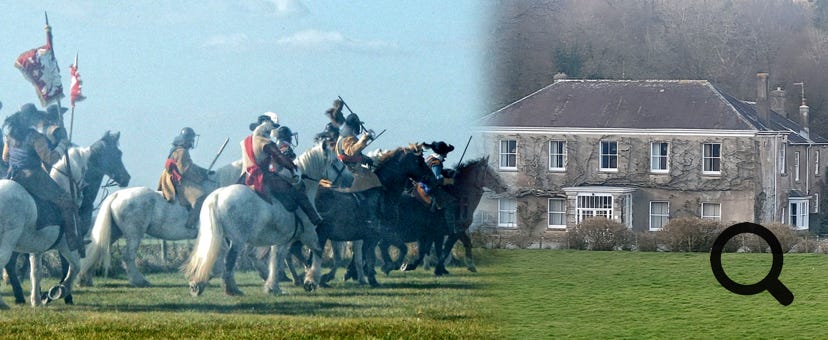Lily Style Author
Home | Ancestry scrapbook | Contact | Facebook
Puritan bullies in 1640s South Brent
(first published in Ivybridge iMag in February 2023)
Historical documents rarely reveal the intimate stories of women and children, unless they were aristocrats. One of the few mentions of them is in a 1697 book about families of Devon by John Prince (reprinted in 1810). Prince’s book includes an account of a vicar’s wife being bullied by Puritans in 1640s South Brent. Her story survives because the events impacted her husband, John Gandy (brother of Henry, who gave his name to Gandy Street – Exeter’s cobbled shopping street, believed to have inspired J K Rowling’s “Diagon Alley”). Whilst vicar John Gandy certainly seems to have been targeted, his unnamed wife appears to have been bullied more.
1640s England was in the middle of the Civil War between royalist supporters of Charles I, and Puritan Parliamentarians, who sought common rule and the abolishment of bishops. John Gandy was a royalist whose “loyalty soon rendered him obnoxious to the rage and plunderings” of the area. “About the year 1645” Mrs Gandy had recently given birth, and had her new baby at her breast, when mounted Puritan soldiers stormed to their South Brent home, while her husband was in London. They dragged her out by force and, “when she would catch at the staples of the doors to stay herself, or any other thing, they would barbarously knock off her hands ; until at length they forcibly threw her into the streets, with several little children she had, there to beg, or starve”.
This wasn’t the first time the Gandy’s home had been attacked. It “was also several times alarm’d and ransack’d by the Parliament Soldiers.” and, “Once more particularly whilst they were committing their outrages, Mrs. Gandy told them she believed some of them might have wives of their own” and asked them not terrify her because she was heavily pregnant. One of the intruders responded by saying she looked more like a “tyrant than like one that would be affrighted”. He pulled a rope out of his pocket and told her, “I will hang up thy husband with this at his gate.”
The Puritan militia captured her husband, vicar John Gandy, on his way to church in 1644 and carried him to Dartmouth “about eleven or twelve miles away… in his habit, with his Bible in his hand, as they had seized him ; and was there kept under confinement, till he purchased his liberty at the price of one hundred pounds” (approximately £10,350 in today’s money). When John Gandy was taken to his cell in Dartmouth, “he asked for a bed ; whereupon the serving-maid, with a great deal of scorn and insolence, gave him this (or some such) answer ; That be should have a rope”.
Prince says, “the barbarity of this action” was even worse because Jelinger – a Puritan preacher the soldiers replaced John Gandy with – had fled Germany because of his religion and, after arriving in “Exeter in a very poor condition” had been taken in and cared for by John Gandy’s father. On top of this, and Mrs Gandy’s eviction with a newborn baby at her breast, “what completes the vilany [sic] is, that the soldier who was most forward in turning the family out of doors, had been released from prison, where he had lain some time for debt, by Mrs. Gandy.” In other words, a man Mrs. Gandy had freed from prison with her own money (not her husband’s) led the gang that threw her, and her tiny children, onto the street when her husband was in London. So, at least one of the soldier was well-known to her, and the whole militia may have been members of the community. The only one named is “Major W., who had been one of [John Gandy’s] chief persecutors”.
Where in South Brent was the house Mrs Gandy and her children were dragged from by the Puritan soldiers circa 1645? Peter Taylor, author of a comprehensive, work-in-progress history of South Brent’s St. Petroc’s church, believes the Gandy’s home was the former vicarage (now Manor House) to the right of the river Avon, between St Petroc’s church and Lydia Bridge.
John Gandy was deprived of most of his vicar’s income until the monarchy was restored in 1660. “Towards the latter end of usurpation, he was permitted to hold the Rectory of Bridford in the County of Devon ; where he continued until the Restoration”. Bridford’s parish records are among the few that have survived from the 1600s. They show John Gandy and his unnamed wife having at least three more children during their time there.
After the restoration of the monarchy, John Gandy, “retired to his living of Brent, and died there in 1672.” One of their children, Henry Gandy, born in Exeter in 1649, went on to become a senior fellow of Oxford’s Oriel College, and made news by refusing to swear allegiance to William and Mary in 1690.
